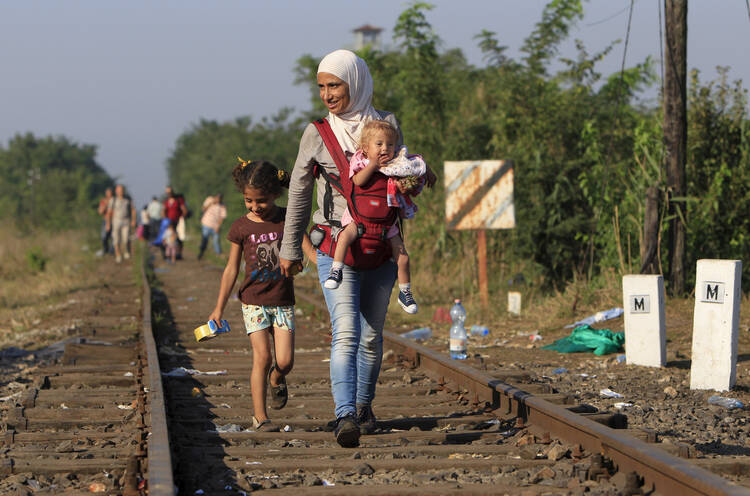Pope Francis made a passionate appeal to the international community to find ways to resolve the conflicts in Syria, Iraq, Jerusalem and the West Bank of the Jordan, where there is “an escalation of violence” that is bringing destruction and great sufferings to the peoples living there.
Speaking during the opening session of the Synod of Bishops on the family in Rome on Oct. 9, he called on the international community “to broaden its horizons beyond the immediate interests and use the instruments of international law and diplomacy to resolve the ongoing conflicts.”
The deteriorating conditions in the Middle East and the precarious position of Christian families in Syria and Iraq and those driven by regional conflict to migrate to Europe had already been a major component of discussion during the synod. At a press briefing on Oct. 8, Syrian Patriarch Ignace Youssef III Younan spoke with passion and grief about the members of the different Christian churches “who want to get out of this hell because they are persecuted, taken hostage, by the ISIS terrorist state.”
“For us it’s a catastrophe,” he said.
Christian persecution and conflict in Syria and Iraq had been cause for concern already, but the recent acceleration of tension and violence in Jerusalem and the West Bank heightened the urgency of the pope’s appeal. He called on synod participants “to pray for reconciliation and peace in the Middle East” and told them he is “stricken with pain” and is “following with deep concern what is happening in Syria, Iraq, Jerusalem and in the West Bank, where we are assisting at an escalation of violence that is involving innocent civilians, and feeding a humanitarian crisis of enormous proportions.”
Throughout September and continuing into October, Jerusalem and the West Bank have been rocked by violent outbursts involving both Palestinians and Israelis with shootings, stabbings, riots and arson attacks. Contributing to the crisis—and growing fears of the possibility of a new intifada among Palestinian youth—were the moribund peace process and tension over access to the religious site in Jerusalem known to Muslims as al-Haram al-Sharif, or the Noble Sanctuary, and to Jews as the Temple Mount. A long-running campaign by some fundamentalist Jews for expanding rights to worship in the Al-Aqsa mosque compound on the Temple Mount, supported by members of Israeli prime minister Benjamin Netanyahu’s own cabinet, has raised the suspicion that Israel intends to change the precarious status quo for the site.
Speaking just a few hours before the Nobel Committee awarded the peace prize to Tunisians working for peace and democracy, Pope Francis told synod participants, “War brings destruction and multiplies the sufferings of peoples. Hope and progress come only from choices for peace.”
The synod’s prayers for peace, he said, are intended as “an expression of solidarity” with the Middle East patriarchs and bishops, “as well as with their priests and faithful and everyone who lives there.”
The pope also drew attention to the ongoing conflicts in some African countries, which have also been discussed in the synod. “Let us pray too for those zones of the African continent that are living through similar situations of conflict.” He will no doubt repeat this plea when he visits Kenya, Uganda and the Central African Republic in the last week of November.








